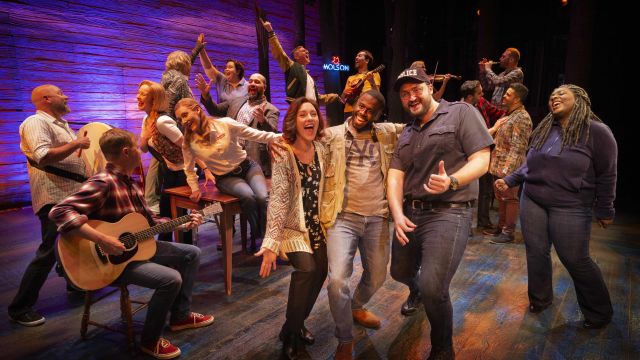Come From Away Originals
As the Australasian tour of Come From Away resumed in 2022, Neil Litchfield spoke to two actual Ganderites, Brian Mosher and Oz Fudge. They’re among the interviewees whose accounts of 38 jets descending on their small Newfoundland town on 9/11, and the days that followed, inspired the verbatim musical. He also chatted with the actors who now portray them.
All was quiet on the morning of September 11, 2001 in the town of Gander.
The Jet Age had bypassed Newfoundland’s large Gander Airport. Subsequently, airlines had pulled out of the previously vital re-fueling stop for long haul international flights.
It was a normal day for Gander police officer Oz Fudge, and Brian Mosher, reporter for Gander’s community TV station and media teacher at a local high school, except that it was the first day of school, and there was a bus strike.
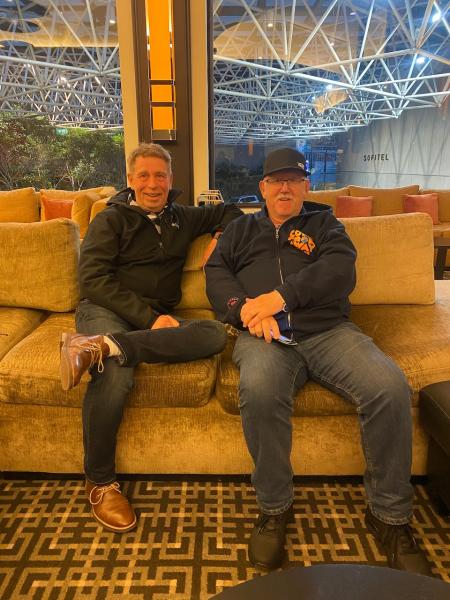 Image: Brian and Oz,
Image: Brian and Oz,
“Gander was a small town of 9,300 people. The ultimate small-town living,” says Brian, “basically everything you need, but we’re not anywhere near a bigger centre. It’s a very organized town - beautiful to live in. Everybody knew everybody. No-one’s more than 7 minutes from anyone else. It’s a great group of people who really care about the community. I dropped in for a visit in 1983, and I’m still there. It’s a very well-kept community. It’s clean, it’s tidy, and properties are well maintained.
“If you didn’t lock your door, it was no big deal. Most people would now.”
“I’ve never locked my door,” Oz retorted.
“People wouldn’t take keys out of their cars,” Brian added. “If your wallet got left in the car, you’d get it tomorrow. You knew every family in town.”
Gander is very much an aviation themed town - only three streets aren’t named after aviators, or somebody to do with the aviation business, which they’ve extended to astronauts and the shuttle program.
“You could tell a person from Gander versus a person from outside,” says Oz, “because when an aircraft went over, no-one looked up, whereas if you were from outside you all looked up.”
How did Brian and Oz first become aware of the 9/11 terrorist attacks?
“I had a twofold job. I was a TV reporter, and the local high school media teacher,” says Brian. “In 2001 we had full closed circuit throughout the high school building. There was a bad audio cable I had to fix. To test it I ran live Cable TV through it. When I flicked it on, it was the North Tower, with smoke coming out the window. I thought it was just a wing clip from some guy flying a plane, so I turned the channel, but it wouldn’t go away. Then the plane hit the South Tower, and that will stick with me.
“But Gander and New York were very far away from each other - actually they’re not - but until that moment Gander and New York were very far apart.”
A bus strike on September 11 meant that parents had to drop their kids off at the town’s two schools – that meant a lot of cars. Oz was doing the policing.
“I wanted to slow the traffic down, so I was just running the radar to try and protect the kids,” says Oz. “In the play it shows Bonnie Harris waving to me, and that is exactly how it went. She said, ‘Oz, turn on your radio.’ I thought, ‘What does she want me to turn on my police radio for.’ ‘No, you fool - turn on your radio – listen to CBC.’ Just like Brian, I thought it was only a small plane clipping the building, or a disc jockey in New York trying to make a name for himself had looked at War of the Worlds and come up with this. Then I went home, turned on the TV, and there it was. Holy Shit!”
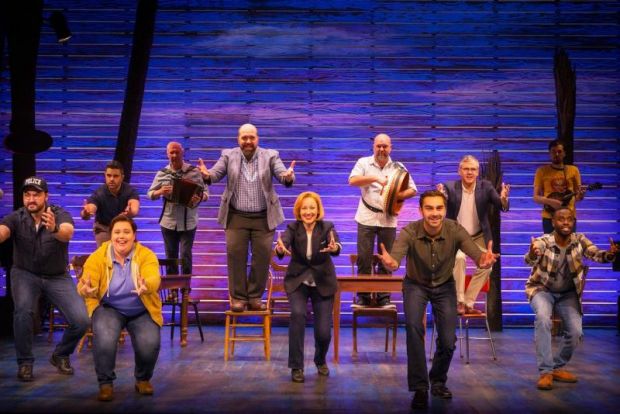
Suddenly there was a change in the air in Gander. Literally!
“All of a sudden you could smell jet fuel. Like cheap kerosine,” said Brian. “There were a lot of wide-bodied jets coming, but they were also blowing the fuel tanks at a high altitude to get rid of the fuel.
“You couldn’t just smell it, you could taste it,” they both said.
“It was on the inside of your cheeks,” Brian said. “But then you see all these lights. We don’t see massive landings, let alone 38 wide bodied jets in a row.”
“In the afternoon I got a call to go to the airport, and the first thing I see is Brian,” said Oz. “up on top of the cable TV van, on top of a milk carton, with a camera, filming, and they had driven right into the fence.”
“We had to shoot over the barbed wire fence,” added Brian. “We were about 20 feet up. We got great footage.”
“The whole town was out to see all these planes,” Oz added. “So, I’m on the runway that runs North and South, and I look to my left and see a Jumbo Jet is coming. She lands, and then I look and here comes an L1011, which is just a little bit smaller. Then I look into the skies and you could see the lights of the aircraft as they’re circling the town, and they would go up, drop the fuel, and the smell of the fuel – unbelievable.”
“And then you had the dirty burn of a jet coming in,” adds Brian. “They didn’t bring them in over the town. For one thing, they needed the longer runway, and the other thing is, if someone blew them up, they didn’t want to take out houses. They fully anticipated that something else was going to happen that day – it was a day of mistrust.”
Gander mobilised. An emergency school staff meeting was told that they had two, maybe three, hours to turn the high school into a hotel.
“We had to take all the chairs and desks into the hallway, and stack them to the ceiling,” said Brian, “and put all the teachers’ confidential records, files and computers in a secure location.’
“I drove up to the Gander Academy and the Principal was out sitting on the front step,” said Oz. “I said ‘What’s Going on?’ He said, ‘I just got the phone call – expect passengers.’ ‘How many?’ ‘We’re not sure; it could be 500, it could be a thousand.’ I asked what’s going on. He said,’ I called one teacher to get us some volunteers. We have to clean the school.’
“So I come back again three hours later, and the principal is out sitting on the front step. I said, ‘you didn’t get anybody,’ and he said ‘no, it’s all done.’ I said, ‘what do you mean it’s all done?’ He said, ‘We got all the thousand desks moved, we got everything set up, and we’re just waiting for passengers’.”
“There was an impromptu meeting at about 5.30. We’d hit a stall pattern,” said Brian. ‘The information feed in 2001 was terrible. A few of us had cell phones, but that was only to make phone calls. I called my producer at the TV station, who changed the colour on the community scrolling, which you had on screen when there was no programming. He said, ‘You dictate what you want.’ And we got the announcements up. Within 45 minutes I saw a response like I’ve never seen before.”
“The principal at Gander Academy said it was just like in the movies. There were people walking across the street from behind the school. Car headlights were coming from all directions,” said Oz.
“Sleeping bags, phones, mattresses, beds out of people’s houses, clothing,” Brian added. “It was unusually warm that week, so people were bringing in coolers, fans, bags of ice, bottled water, boxes of granola bars – stuff we hadn’t even had time to fathom.”
“There was no script. It was inventing the wheel, as you were driving the car.”
“You tell me an emergency plan – you plan for fire, you plan for floods, you plan for that,” said Oz. “But where do you plan for 7,000 people to drop into your town for a bucket of tea and a bickie, and have everything ready for them.”
 Image L to R: Brian, Neil Litchfield and Oz.
Image L to R: Brian, Neil Litchfield and Oz.
And the experience of having so many strangers in town?
“People from big city New York aren’t used to getting into strangers’ cars,” Brian said. “It’s like, ‘There’s these people inviting me to get into their car, or putting me in their house, and insisting they feed me.’ But within 48 hours they came to know who we were.”
“The mayor best summed it up,” Oz said. “When they came they were strangers, mid-week they were friends, end of the week they were family.”
“And we cried when they boarded the planes,” Brian added.
Brian and Oz love the accuracy with which Come From Away captures them and their community.
“They nail it,” said Oz. “I had a lot of reservations about how they were going to portray us, but I was gobsmacked. They got us! They got who we are; they got what we are. They got everything about us – our language, our style. Everything was done to the tee.”
When the characters in Come From Away stand for a moment of silence during the show, it reflects and an experience of Oz’s, which he shared.
“I was at the gas station picking up a bottle of Pepsi, because I wouldn’t take any of the food for the passengers,” Oz related. “As a cop you’re aware of what’s around you. I saw two cars pull over on the Trans-Canada Highway, then more pulled on the other side, and I wondered, ‘What are they doing?’ Doors opened, and the guys stood on the side of the road, with their hands on their chests. And at the gas pumps, the fella stopped pumping gas. Inside the restaurant, people were standing up at the tables, hands on chests, and then I realized - Holy Shit! This was when Bush had called for a moment of national silence, and it was truly amazing to watch as people did that.”
In Come From Away Joe Kosky plays the town cop, and hearing that story from Oz has reshaped his perspective.
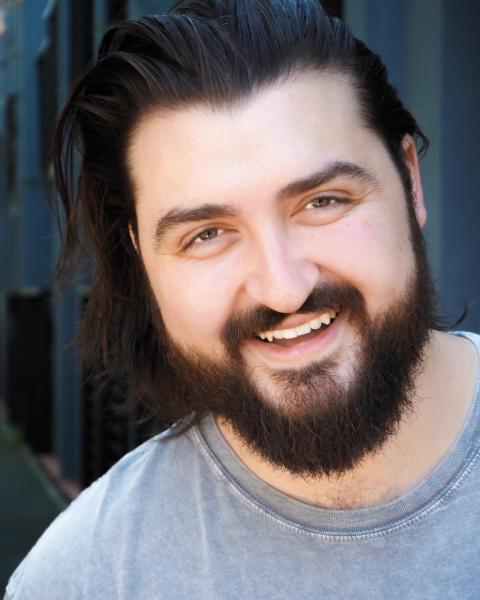 Image: Joe Kosky.
Image: Joe Kosky.
“I used to think of it as similar to attending Anzac Day services as a child. I grew up in the country town. Now, having heard his first-hand account, and particularly the hand on chest because to see people stop what they're doing in the modern era and put other people before themselves is truly profound and something that will stay with me.”
In that scene in the show most of the cast are facing a monitor upstage.
“We’re imagining that this moment of silence is occurring, with our backs half to the audience, while one character, Kevin T, speaks to the significance of the moment. For us it's just experiencing the sort of the reverence and the impact of what those events meant to the people they affected, and, by extension, meant to the rest of the world. So just coming to that moment with a sense of nothing else matters, this is all that's important right now. There’s this profound moment of stillness where nothing else matters. All that matters is that we give our attention and our respect to the people who lost their lives,” says Joe.
When Joe met Oz for the first time, he discovered that Oz is a straight shooter.
“The first thing he said to me was ‘a proper policeman doesn't have a full beard – moustache only’. After he saw the performance, he was genuinely appreciative of the way that we portrayed characters from his town. It was really reaffirming. He was so generous, and he was every bit the character that I that I had heard he was. We got to spend a good amount of time together on opening night. We holed ourselves up in a corner, drank some beers and just swapped stories.”
Oz shared another anecdote about a visitors’ confusion at an act of kindness, which is reflected in the show.
“I’m in the Community Centre and a guy looks at me and says, ‘You guys are nuts.’ I said ‘Why?’ He says, ‘I was at Walmart and the girl at Walmart said, Are you one of the plane people?’Yes, I am. Would you like to come home with me for a shower. He kind of laughed and said”, ‘Yes I would. Anybody with you? Yes, my three friends. She goes to her manager, comes back and says, OK, let’s go. They go to the house. She said, the towels are there, the bathroom is there, the kitchen – loaded with food – get whatever you want. Living room – just turn on the TV and watch whatever you want to watch. See you later, I’m going back to work. And he looked at her and said, are you crazy? We could steal everything. And he said she stopped and turned around and looked at them and said, so, it can be replaced. Enjoy the house’.”
“That sentiment is carried throughout the show,” said Joe.
“I stayed at the school all night, the first night, not knowing that I would have duties at the cable station starting the next morning, and I’d be doing three shows a day for the next four days,” Brian told me.
“I was the information feed for the town - myself and Janice (local newspaper reporter Janice Gaudy). On Thursday Oz came in, as he did three times a day before every show to drop off pieces of paper with messages on them. I got all my town information from him. My producer had recognized my fatigue and he said, ‘Oz is here for an announcement - he’s being legit, don’t tell hm off.’ Oz had this ongoing gag. The message simply said, ‘Gander Academy is running low on toilet paper.’ So I just put it on the 3.30 show ‘… and Gander Academy is running a bit low on toilet paper, so if you have a couple of extra rolls would you mind bringing it to Gander Academy.’
“Soon after that I was getting ready for the 5.30 show. Oz is back and he’s got this sheepish grin on his face. My producer is back between us again, saying, ‘OK, he’s still being legit.’ He had a typewritten piece of paper, with a handwritten note at the top that said, ‘For the love of God, stop bringing toilet paper to Gander Academy’. Apparently in an hour and 15 minutes they had filled a classroom with toilet paper.”
Janice Mosher, currently played by Manon Gunderson Briggs, combines elements of Brian and local newspaper reporter, Janice Gaudy.
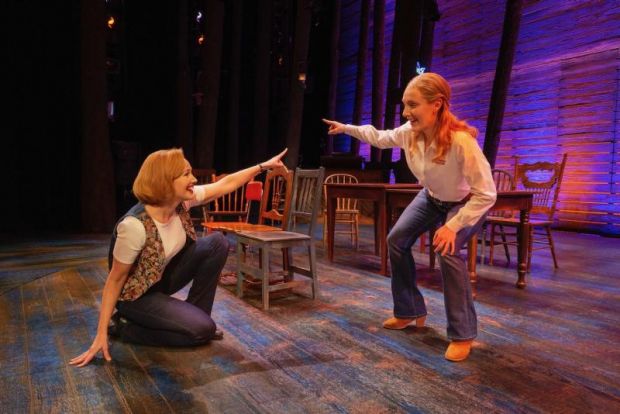
Image: Zoe Gertz and Manon Gunderson-Briggs. Photographer: Jeff Busby
“When the show came back after Covid that lie got a huge reaction because of all the bulk buying of toilet paper during the pandemic. It took on a whole new meaning,” says Manon. “When I saw it for the first time, I laughed my head off.”
“It's part of a number called ‘Blankets and Bedding’. Gander is getting ready for this arrival of 7000 people. As it starts my character is very together, telling everyone the facts of the situation, getting everyone ready. Then throughout the number everyone gradually becomes a little bit more stressed, so I start saying ‘some pews need to be moved, and we need a couple more prescriptions down at the pharmacy, oh and if anyone has toilet paper bring it down to the Lions Club’, then it finishes with this lovely little interjection punchline of ‘for the love of God, stop bringing toilet paper to the Lions Club.’
“It always gets a great reaction. It all builds up - it's quite amazing that the writers have been able to keep so much of what was really said in the script and make it work in a dramaturgically.
“The first time I read the script because I hadn't seen the show before, I didn't really get the toilet paper reference. Then I saw it for the first time. There’s always a huge reaction because it's just so funny - this everyday product has such high stakes.”
The first time Brian and Manon met, he gave her a big hug, and said you’re a Mosher.
“To hear that Brian Mosher saw me as a Mosher was a pretty remarkable moment. He said that he likes what I'm doing, which is always a great bit of feedback to have, but you don't normally get the actual person that the role is based on telling you that you’re doing a good job. It’s a once in a lifetime opportunity to have the actual person that the role is based on in the audience. It helped ground me a lot. You try to get as into the character’s shoes as much as you can, but when you’ve got the actual person sitting out there and it's their lived experience, it really puts a whole new perspective on the character.”
“There’s this great bit at the end of the show, where Janice says, ‘you know the Oprah Winfrey show called’, which actually happened. Brian still has the voicemail on his on his phone at home and he played me a recording of it. A representative from the Oprah Winfrey Show called him up and he’s still got the message. When Brian was playing that recording for me, I was actually feeling the excitement of that scene in a whole different way,” said Manon.
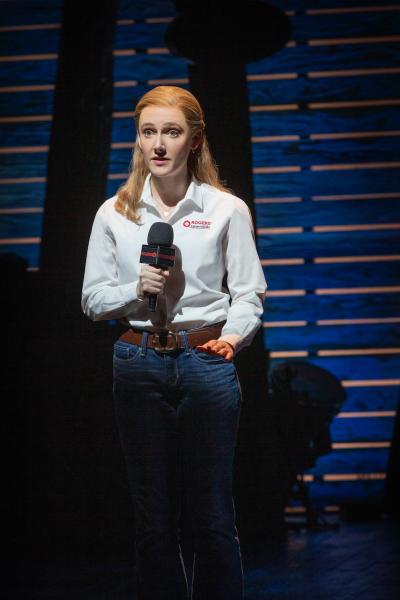 Image: Manon Gunderson-Briggs. Photographer: Jeff Busby
Image: Manon Gunderson-Briggs. Photographer: Jeff Busby
“Seeing Manon and Brian together, they were like two peas in a pod,” Joe told me. “They were exactly the same in personality, they had this same sort of cheeky sense of humour, this bubbly spirit and the moment they met we couldn't get them to separate or stop talking.”
How has Come From Away changed Brian’s and Oz’s lives?
Oz: It’s the notoriety now. I’m in Walmart now and someone will say, are you Oz Fudge?
Brian: People ask us for autographs. Now what is the chance of a small town volunteer being asked for an autograph.
Oz: One trouble with being a town cop - most people didn’t want my autograph.
Brian: Yeah, because it was usually at the bottom of a ticket.
"I think Oz secretly loves being a bit of a rock star," Joe told me.
And, of course, there’s travelling all around the world to share their experiences, and to see productions of Come From Away.
Australian production images by Jeff Busby.
Subscribe to our E-Newsletter, buy our latest print edition or find a Performing Arts book at Book Nook.

